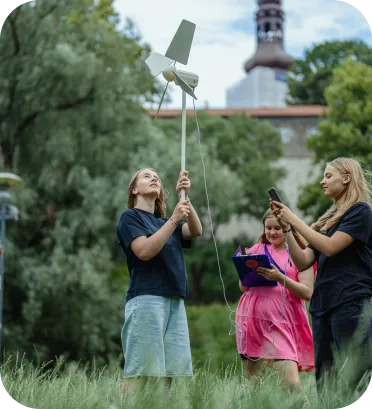
Booking form
Be the first to try new outdoor STEAM-tools worth €2500


Apply

Wind turbine:
1 toolset for 3 projects
for a free test kit
Book a demo
free testkit for 10 applicants

An effective educational tool that has long-term benefits and helps students connect what they learn with their everyday life. In our town, there’s also a wind turbine, so the tool really sparked the students’ interest.
Marietta Lõo, teacher (Antsla, Estonia)

Huvi starter set for the wind turbine includes:
Downloadable STEAM curriculums
Downloadable lesson plans for teacher
Downloadable experiments, tasks, and study materials for students
Downloadable assessment guidelines
Digital object design for blades as CAD files
Supplements for 2 student groups (8-10 students in total)
In case your class is bigger than 10 students,
you need more boxes for the best teamwork experience. 1 extra box covers a group of 4-5 students. Extra boxes are available when ordering.
Wind turbine model and blades
Wind turbine pole
Anemometer and phone charger
Hot glue gun
Wooden sticks for designing blades
Flipchart and cutting board
Wind turbine set

Each extra box +450 €
1990 €

Wind turbine
The Wind turbine starter set costs

Wind turbine
Wind-powered classroom
How to design an efficient wind turbine? What factors need to be considered when installing a wind turbine on the school premises?
Students will determine, thinking like scientists and engineers, how many wind turbines are needed to supply energy to the classroom.
Subjects: mathematics, natural sciences, history, social studies, art, technology.
Read more here

Wind-powered phone charger
What is wind, and how is it used to generate energy?
The students are asked to think like scientists and work like engineers to design a wind turbine to charge their phones. During the experiments, the students formulate hypotheses, prepare data tables and graphs based on the measurement results, and design new blades for the wind turbine.
Subjects: physics, natural science, mathematics, technology, arts, English (or any other language).
Read more here

Windcatcher
How does a wind turbine work? How to measure wind speed?
Through their own experiments, students can understand how scientists ask questions and how to find answers through repeated experiments and observations.
Subjects: science, mathematics, arts & crafts, language arts, and social studies.
Read more here

Creativity
Entrepreneurship
Problem-solving
Critical thinking
Communication
Collaboration
Information literacy
Media literacy
Flexibility
Adaptability
Goal setting
Social skills
Cultural skills
Productivity
Responsibility
Developing 21st century skills
Huvi’s Wind turbine solution includes everything necessary to build a windcatcher, a wind-powered classroom or a wind-powered charger for a phone. The only thing missing from the package is the wind, which we hope you’ll find by yourself outside of your schoolhouse.
Step into the captivating world of wind energy projects, where young minds embark on a thrilling journey of scientific exploration and discovery. With this engaging kit set, students will uncover the mysteries behind wind turbines, chargers, windcatchers and turbines. By delving into their own hands-on experiments, students will experience firsthand how scientists ask thought-provoking questions and pursue answers through repeated experiments and keen observations.
Be the first to try new outdoor STEAM-tools worth €2500
free testkit for 10 applicants


Apply
An effective educational tool that has long-term benefits and helps students connect what they learn with their everyday life. In our town, there’s also a wind turbine, so the tool really sparked the students’ interest.
Marietta Lõo, teacher (Antsla, Estonia)

Huvi’s Windmill solution includes everything necessary to build a windcatcher, a wind-powered classroom or a wind-powered charger for a phone. The only thing missing from the package is the wind, which we hope you’ll find by yourself outside of your schoolhouse.
Step into the captivating world of wind energy projects, where young minds embark on a thrilling journey of scientific exploration and discovery. With this engaging kit set, students will uncover the mysteries behind windmills, chargers, windcatchers and turbines. By delving into their own hands-on experiments, students will experience firsthand how scientists ask thought-provoking questions and pursue answers through repeated experiments and keen observations.

Windmill:
1 toolset for 3 projects
Huvi starter set for the windmill includes:
Windmill set
Wind turbine model and blades
Wind turbine pole
Anemometer and phone charger
Hot glue gun
Wooden sticks for designing blades
Flipchart and cutting board
Downloadable STEAM curriculums
Downloadable lesson plans for teacher
Downloadable experiments, tasks, and study materials for students
Downloadable assessment guidelines
Supplements for 2 student groups (8-10 students in total)

In case your class is bigger than 10 students,
you need more boxes for the best teamwork experience. 1 extra box covers a group of 4-5 students. Extra boxes are available when ordering.
Windmill
Each extra box +450 €
The Windmill starter set costs
1990 €
for a free test kit
Book a demo



Creativity
Entrepreneurship
Problem-solving
Critical thinking
Communication
Collaboration
Information literacy
Media literacy
Flexibility
Adaptability
Goal setting
Social skills
Cultural skills
Productivity
Responsibility
Developing 21st century skills
Windmill
Wind-powered classroom
How to design an efficient wind turbine? What factors need to be considered when installing a wind turbine on the school premises?
Students will determine, thinking like scientists and engineers, how many wind turbines are needed to supply energy to the classroom.
Subjects: mathematics, natural sciences, history, social studies, art, technology
Read more here

Windcatcher
How does a windmill work? How to measure wind speed?
Through their own experiments, students can understand how scientists ask questions and how to find answers through repeated experiments and observations.
Subjects: science, mathematics, arts & crafts, language arts, and social studies.
Read more here

Wind-powered phone charger
What is wind, and how is it used to generate energy?
The students are asked to think like scientists and work like engineers to design a windmill to charge their phones. During the experiments, the students formulate hypotheses, prepare data tables and graphs based on the measurement results, and design new blades for the wind turbine.
Subjects: physics, natural science, mathematics, technology, arts, English (or any other language).
Read more here











